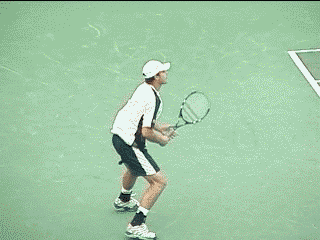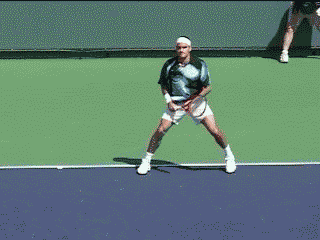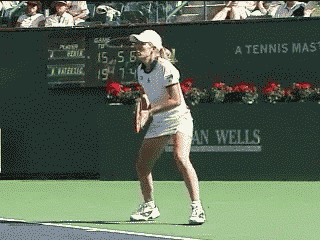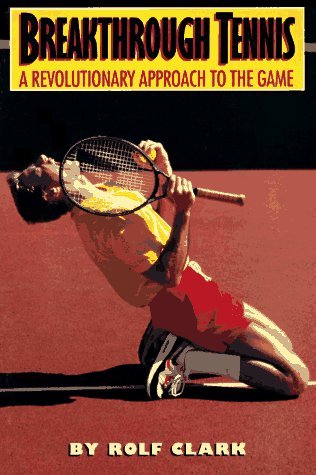|
TennisOne Lessons On Improving Focus Rolf Clark “Watch the Ball.” We almost yell it at ourselves to remind us to focus. But we often lose that focus just as we need it most, at ball impact. We’ll “Watch the ball” as we start the backswing, but lose it somewhere during the forward swing.
I first observed this annoying last-second loss of focus while playing golf. As I set up to swing, I’d tell myself, “Hit through the ball!” But it didn’t seem to help. I mis-hit too often. I tried to fix my game with a few mechanical changes, but they didn’t work. So I began to explore my mental game. That’s when I found I was not focusing on “Hit through the ball” at impact. That thought was lost somewhere between the backswing and the ball impact. I explored this for a week or so, and got much better at keeping “Hit through the ball” conscious for my whole swing. My golf score improved significantly. In other words, just before impact my mind seemed to shift to the results I wanted instead of staying with the action I needed to get the results. I was not watching the ball when it counted. Once that became clear I worked hard to learn to hold my focus throughout the swing. My tennis improved. Exploring your focus might pay off in your game, too. But how do you do it? Learning to focus You explore your focus by becoming aware of your focus. You need to “Focus on how you focus” for a few days. Find out what your mind does during the swing. Become aware of your mental activity.\
Become especially aware of what your eyes and mind are doing as you hit. Are your eyes glued to the ball throughout the swing? Is your mind as engaged in the impact as your eyes are? “Watching” requires both eyes and mind to be focused on the same thing. If possible, find out if, as you watch the ball, you can also sense the racquet swinging toward the ball. It is best if eyes, mind, and body are all engaged simultaneously in the action of hitting the ball. Explore these focus thoughts while playing a fairly serious round of tennis, not only while rallying. You need to explore your focus under pressure. You need to be susceptible to those mental distractions to focusing (“Pass her,” or “Put the ball away!” or “Win this point!” and other such thoughts) that take over your mental game at critical points. Become especially aware of what your mind and eyes are doing from backswing through impact. How do you explore that? Immediately after each point, ask yourself what you focused on during your last few hits? If you don’t remember, keep exploring. Once you do become aware of how you focus, you will able to improve the way you focus. What to focus on
“Watch the ball!” is not the best command to focus on. It’s incomplete. Watching the ball is certainly better than not watching it, but “Watch the ball” not comprehensive enough. It tells you what to do with your eyes, but fails to remind you to also focus your mind. You also need to feel your racquet as it moves to the ball. You need the combined action of your eyes and mind focusing on the ball’s movement while your body simultaneously feels the racquet come to and through the ball. Therefore, a better focus command would be something like “racquet through ball!” That will encourage eyes, mind, and body to all be involved in the action as you hit the ball. Practice focusing on driving the racquet all the way through the ball. Make it become natural to maintain the thought “racquet through Ball” all the way through the impact point. Get to where you do this on every swing and your game will become more consistent and more powerful. Admittedly, “racquet through ball!” may not work best for everyone. If you prefer, try “Drive the sweet-spot through the ball,” or make up your own exhortation, or even revert to the traditional “Watch the ball!” Exactly what words you focus on is less critical than holding the focus through the swing. Does everyone need to work on focusing?
According to personality theories (“Myers-Briggs” being one), there are some people who naturally “live in the moment.” For reasons best explained by psychologists, these personality types may not need to explore the same thought dynamics we are exploring here, as such people naturally focus well. They are “mentally tough?” I think tournament players have that natural focus, and that focus allowed them to reach tournament level play in the first place. Some are better at focusing than others, but if they qualify for tournament play, they probably were mentally tough to begin with. But for most of us, learning to focus is important. Why else would we say “Watch the ball!” in the first place? Summarizing Working on your tennis focus helps. Get to where your selected exhortation remains from backswing through impact. Try “racquet through ball” and see if that coordinates your eye, mind, and body in performing the action needed…though what you focus on is less important than keeping the focus through your whole swing. If you are one of those who do not naturally focus well, you may experience a major breakthrough. Your comments are welcome. Let us know what you think about Rolf Clark's article by emailing us here at TennisOne.
|




